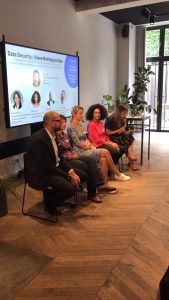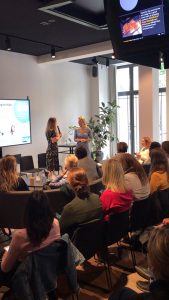“Data Security: I have nothing to hide” was the topic for the conversation when Global Digital Woman invited to a panel discussion held at SAP’s Data Kitchen in Berlin. Around 90 participants gathered up and for those who didn’t have the possibility to participate in person there was a live stream where around 250 followed.

The CEO and founder of Global Digital Woman Tijen Onaran gave everyone a warm welcome to start the event as well as the week. As an introduction to the topic Birgit Hess, Cloud Security Awareness Lead at SAP, was invited to the stage. She opened with a flirt to all the matrix fans. But what is the core message of Matrix? Don’t trust your own eyes. The conversation got much more serious as she talks about deepfake, a technique for human image synthesis based on artificial intelligence. The phrase “deepfake” came along in 2017. Since then with the capability to combine and superimpose existing images and videos onto source images or videos we have seen a development for the online community where it is getting harder and harder to separate the different content. A compromising deepfake picture like that can ruin my career or my personal life, because maybe I don’t have any proof that it’s fake.
Birgit warned us that unreliable data is getting more and more common. Therefore, big data is getting less important and we will see more value in real data. Data that we can prove is valid and accurate will gain much more value. Big data is great for statistics but loses its value if cannot prove that it is real. In order to do so we need an unbroken chain. “I predict that in 5 years from now we will not talk as much about big data, we will talk about real data”, said Birgit.
A lot of people complain about the GDPR, but Birgit tells us that she is a big fan. She points towards the integrity of the data. Everyone who is touching data is responsible. Not only firewalls and antivirus. There is a difference between keeping people out and to be able to prove that no one had been able to break in. We are getting more and more vulnerable. We need to make sure that the data we have is secure, valid and accurate. So, how do we see ourselves within the Matrix? Do we pick the red or the blue pill?
Next on the agenda was the panel discussion with:
– Elena Jolkver, Consultant in Data Analytics and Machine Learning at xValue.
– Alisha Andert, Head of Legal Innovation at Flightright and Legal Tech expert.
– René Bader, Manger for Criticial Business Applications & Big Data at NTT Security
– Birgit Hess, Cloud Security Awareness Lead Europe at SAP
– Tijen Onaran. CEO at GDW. Moderator

Tijen wanted to know what the essence for data security tells us and how can it be defined? Our panel describes it as the cautions of sensible data. We want to know who has access. How data can be trackable and usable even for the next person. And also, there is a big focus on ethical usage. The possibility to analyze combined data can give us opportunities but also negative consequences that we didn’t think of while creating the tools.
Therefore, it’s important to include the regulation perspective. Why are we doing this? We need to protect our valuables. For our society as well individuals. People have to be more aware than we are used to. Here we have a challenge to integrate the security mindset into our culture. We all want the convenience, but we don’t want to give out too much of our personal data. This forces us to look at the way we see and protect data. On one hand we want to protect the individual, our privacy, and on the other hand we want to protect the data itself, the business out of it.
To feel secure is a deep human need. When we experience that the threats around us are diffuse and unknown a lot of people tend to respond in a very emotional way. There is no guarantee, who, what, and in which context your data can be used. People are talking much more about these issues now, which is a positive outcome from GDPR.
When we interact with data and share a lot about ourselves, we create our digital twin online. We get back as much as we send out. What we post and search for will dictate the feed that we get back. This way we get a very selective information.

With machine learning we see good opportunities to detect security leaks. Data traffic can be analyzed, and the
algorithms are getting better and better. But here we see a mutual development form both sides. Data security protectors vs hackers, where both sides are using the same technology and create a race.
An important step is to put this into the education. We need to have an awareness even for the younger generations to protect their privacy.
But what does it mean for the start- up world? There is a challenge in terms of huge investments. There are a lot of costs involved to educate your staff. You constantly need to keep up to date on a topic that is rapidly changing and evolving. And not only from a technology perspective but in the view of laws and regulations as well.
Startups tends to be data driven companies which means that they depend on data. Their own as well as others. The need for accuracy is huge. Making investments based on false data set can mean the end for a small startup. For companies who have the means to sort needs to make sure what they collect. The core is a process that involves all the perspectives. The innovation part as well as the regulation and not to see them as counterparts to one and other. The data security mindset needs to be a norm.

When we meet up in a year, what can we expect the situation to look like then?
The panel expected the discussion to keep on going. And that there will be conversations going on, on a global level. There will be growing interest for what other countries doing to tackle the same issues. The value of real data predicts to compete with the addictiveness of big data. As final advices the panel encourages us to find balance. “Be aware but don’t mistrust.”
And then there were time for questions from the audience: How do we apply this for the industrial platform where we have different companies? Here it is important to make sure to draw up contracts and share the responsibility. Make sure to START with this. It may be the case that enthusiastic people come together, with great ideas, but then the regulations and framework will not be thought about until afterwards. Security should not come as a stopper in the end, it should be integrated from the very beginning.
Do we have no control? If all companies are doing data mining and tar- get me for marketing, what can I do? Start with an awareness on how you are interacting with online data. There are some simple steps to follow as to check your security settings, empty cache now and then, use different accounts and use different search engines. Ask around how others in your surrounding are doing…
Emelie Gustafsson / cloudical
